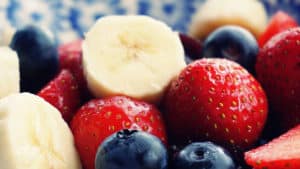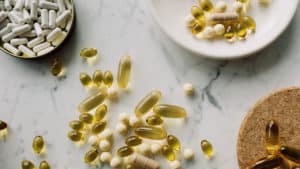PMS is exceptionally common with an estimated 80 percent of women experiencing it at some point during their life. Fortunately, it may be possible for women to alleviate PMS by making simple dietary changes.
What is PMS?
Before learning how to effectively combat PMS through diet it is important to first understand what it is. PMS is a condition that stems from hormonal imbalances. There are many potential causes of hormonal imbalance with one of the most common being menstruation. During the first half of the menstrual cycle values of an essential hormone called estrogen increase dramatically. In healthy systems, this is counteracted by increased production of an estrogen regulating hormone called progesterone. If for any reason estrogen levels remain significantly higher than progesterone, known as estrogen dominance, serious issues including PMS may develop. Although menstruation is a frequent PMS contributor, there are many other factors that can lead to or contribute to the development of PMS.
There are many symptoms associated with PMS that, depending on individual patient factors, vary in duration, occurrence, and intensity. In some cases, symptoms can so severe that medical treatment is required. However, most women experience symptoms of PMS at a more tolerable, albeit frustrating or inhibitory, level. Some of the most common symptoms of PMS include:
- Anxiety
- Bloating
- Breast tenderness
- Cravings
- Depression
- Fatigue
- Increased emotional sensitivity
- Insomnia
- Muscle aches and/or cramping
- Nausea
- Sudden changes in mood (anger, irritability, etc.)
- Tension
- Weight gain
Many women struggle to manage the varied symptoms of PMS through medication and treatment alone. Interestingly, an increasing number of reports state that dietary improvements in conjunction with or apart from medical assistance may effectively alleviate PMS symptoms.
What Foods Help Alleviate PMS Symptoms?
What we choose to eat has significant influence over virtually every bodily function. Depending on your unique situation, consuming specific foods can actually change your body’s ability to regulate various areas of wellness. For example, eating more of the following foods can help combat PMS by providing proper nutrition, reducing the risk of hormone irregularities, and balancing multiple systems in the body.
Broccoli
Many veggies can help reduce PMS symptoms. However, broccoli stands out from the rest. Vitamins A, C, B6, and E as well as calcium, potassium, and magnesium are all found in broccoli. Many of these nutrients help regulate hormone balance thereby limiting PMS intensity. Furthermore, the high amount of fiber in broccoli supports estrogen balance and healthy digestion.
Bananas
Menstrual cramping is one of the most prominent symptoms of PMS. Fortunately, it may be eased by regularly snacking on a banana. Bananas are full of vitamin B6 and potassium, which help combat water retention or bloating as well as cramping.
Eggs
Many describe eggs as a superfood and for good reason. Eggs provide vitamins D and B6, which have been shown to help alleviate symptoms of PMS. Eggs also contain vitamin E which studies indicate may improve brain chemical activity relating to PMS symptoms.
Iron-Rich Lean Meats
Iron deficiency is often seen among women with PMS as a notable amount of the important mineral can be lost during menstruation. You can replenish the body’s supply of iron by eating lean meats such as liver, oysters, poultry, pork, and fish. If you do not eat meat, consider using an iron supplement to avoid deficiency or anemia – we recommend HoltraCeuticals Iron Essentials.
Pumpkin Seeds
Pumpkin seeds contain a wealth of nutrients shown to improve PMS. These humble seeds provide up to 75 percent RDA of magnesium, 85 percent RDA of manganese. Magnesium and manganese are recognized for their ability to reduce symptoms of PMS such as irritability and tension. Pumpkin seeds also carry notable amounts of iron, fiber, zinc, and omega-3 fatty acids.
Yogurt
One study found that women with higher consumption of calcium, especially when paired with vitamin D, have a lower risk of PMS. Some brands of yogurt provide up to 25 percent of the daily required value of calcium per serving. Therefore, eating yogurt can be an easy way to acquire the calcium your body needs.
Wild Fish
A Massachusetts study found that women who consumed at least 100 IUs of vitamin D daily had fewer PMS symptoms. Freshly caught salmon, mackerel, sardines, and herring are all excellent sources of vitamin D. The healthy protein and fats found in these fish can also encourage better hormone balance.
Nuts
A variety of nuts including pecans, walnuts, almonds, and hazelnuts are brimming with beneficial nutrients such as magnesium. Research has found that magnesium is an important regulator of the neurotransmitter serotonin, an important and natural mood-booster. Nuts also contain omega-3 fatty acids that are known to protect brain function and help fend off hunger.
Spinach
Spinach is a powerhouse of magnesium-containing roughly 40 percent of your RDA per cup. As mentioned above, magnesium helps regulate serotonin and mood. It can also alleviate symptoms of PMS such as headaches and fatigue.
Chamomile Tea
Tea provides calming sensations that help reduce stress and anxiety. Chamomile tea specifically has qualities that help combat menstrual cramping, irritability, and hormone fluctuations. Additionally, chamomile is caffeine-free, meaning that it is unlikely to cause breast tenderness and irritation that may be triggered by caffeinated products.
Make the Right Dietary Choices to Improve PMS
Many women are faced with the challenge of regularly occurring PMS and its various symptoms. Fortunately, it may be possible to limit the occurrence and reduce the severity of PMS by making simple dietary changes. If you suffer from problematic PMS symptoms, consider including more of the foods mentioned above in your daily diet. By doing so, you can effectively combat PMS and get back to living life to its fullest.


